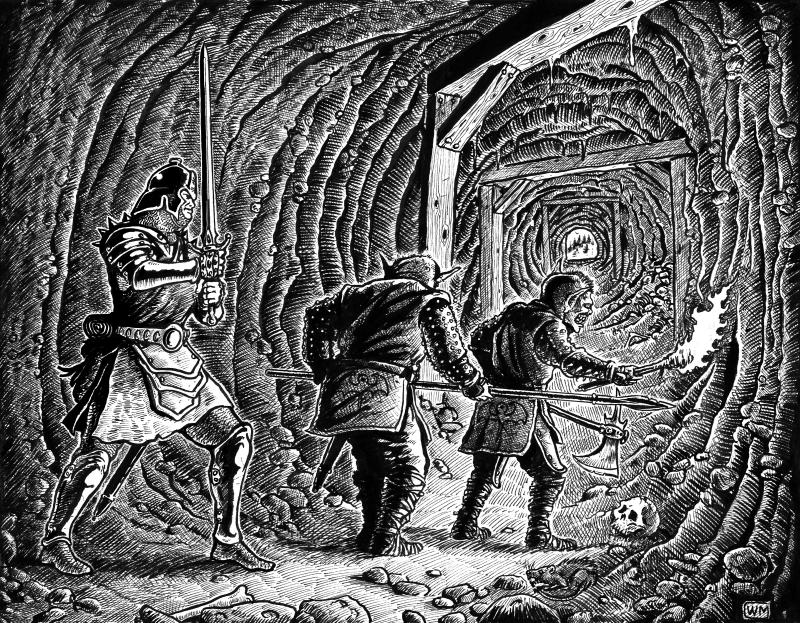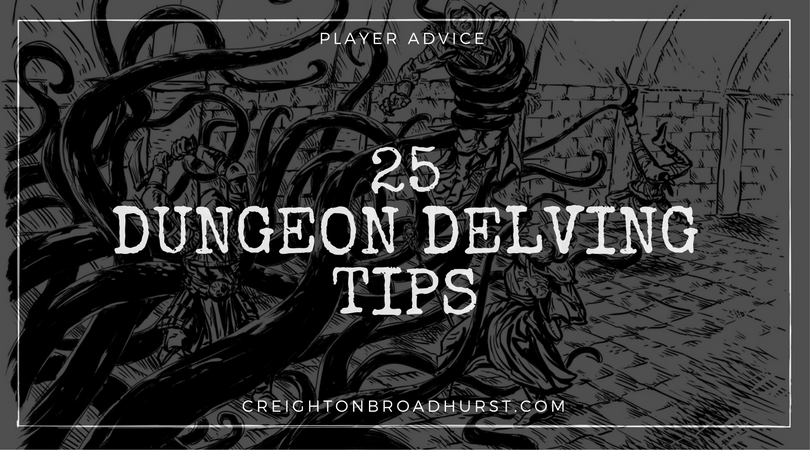Dungeon delving is a jolly dangerous business. Some adventurers are lucky. Others are stupid while many are unprepared. Thus, the bones of countless adventurers lie mouldering far from the warmth of the sun.

With that in mind, and in no particular order, here are 25 tips to make your dungeon delving just a little bit safer.
- Noise attracts attention, and can kill you. Making a lot of noise in the depths of a dungeon is a bad idea.
- Light attracts attention. Many dungeon denizens don’t need light to see which puts them at a great advantage—and makes it a virtual certainty they’ll spot an approaching party of adventurers long before the adventurers spot them.
- Iron spikes are jolly useful. You can hold shut (or open) doors, pits and more. They can also be used to secure a climbing rope. However, hammering them into stone makes a tremendous amount of noise (see #1).
- Learn all you can about the dungeon before you go. Your foresight could ensure you have just the right piece of equipment or weapon—which could save your life.
- Always carry a coil of rope. It has literally thousands of uses.
- Only adventure with people you trust. You are entering a lethal environment—you need to be able to rely on your companions.
- Always carry a dagger—even if you are not skilled in its use. Daggers are easily concealable, light and great for using while in a tight space, being grappled or under water. You can also use them as a missile weapon and they cut rope (see #5).
- Never wander off on your own.
- Never steal from your companions.
- When resting, always set a watch. It might save your life.
- If a party member dies, 9 times out of 10 your objective should immediately change to getting out of the dungeon.
- Pay attention to your surroundings.
- If it looks like a trap, charging into it may not be the best option.
- Unless you can see in the dark, always have a backup light source. If you can’t see, you are easy prey for the dungeon denizens that can see in the dark (and that’s most of them!)
- Oil has many uses beyond fuelling lanterns. Flaming oil can injure foes, while oil pooled on the floor can cause enemies to slip and fall. Oil can also be used to stop door hinges and the like squeaking (see #1) when opened.
- Know your role in the group and stick to it.
- For a delve, always have a goal or objective. Knowing what you are trying to achieve helps you to prepare.
- Fighting in water more than a couple of feet deep is almost always a bad idea.
- Always make a map. It doesn’t have to be super accurate or a work of art, but it does need to be good enough for you to find your way about. It might also help you spot secret doors, hidden areas and more.
- Never split the party.
- Expect things to go wrong. Have a plan for when they do.
- You don’t have to kill everything. Sometimes, diplomacy or stealth is the best option.
- Fighting while climbing is almost always a bad idea.
- Teamwork is your most important skill; practise it rigorously.
- Running away is a good skill to develop. Sometimes you are outmatched and if you fight you will die. You can always come back later for revenge. See here for more on running away.
Related Articles
- More Principles of Successful Adventuring
- Principles of Successful Adventuring
- Run Away! Run Away!
- The 10 Commandments of Dungeon Delving
100 Tips?
Do you have more tips for the adventurers in your life? Share them in the comments below and help more PCs survive their quests! Help me get to 100 tips!

I think you’ve remarked upon this before, but “Have a plan and stick to it.”
It dovetails with “have a plan when things go wrong.” If you are going into an unknown area, know when to leave, whether that’s “explore 10 rooms” or “find the big treasure.” Certainly there are other warnings that you’re in over your head (“party member dies” for instance, or “hit points are at 50% of average”), but we should adopt “best practices” to ensure we remain as safe as relatively possible in an unknown environment.
Know your goal, and when it is accomplished, leave.
Heck, read some of Creighton’s group’s exploits. There are several where “just one more room” has resulted in lots of bad stuff happening.
Here’s the other reason for leaving: You can’t guarantee that stuff won’t follow you, or you won’t encounter more stuff before you’re safe. The orcs may rally and try to track you, so you’d best be able to meet them with a few spells yet in your arsenal. When you’re injured and on the edge is the time when the GM is gonna roll that “00” on the wilderness encounter check and have a 10 HD rabid fiendish owlbear (or worse) show up.
“Heck, read some of Creighton’s group’s exploits. There are several where “just one more room” has resulted in lots of bad stuff happening.”
Smiley face!
Excellent advice. Thank you.
Perhaps this is too broad, but mundane items can be efficiently and creatively used in a dungeon. In short, know what is in your pack that can double as a life-saver:
Flour- from discerning air currents to trap-spotting to uncovering unseen servants. Also good for making pancakes given the right situation.
Crowbar- stuck doors, improvised weapon, very good at smashing and intimidating.
Twine- cheaper than rope, not as tasty as bread and easy to follow back to the dungeon entrance/rally point.
Chalk- blazons, graffiti, quick maps. Different colors for each party member, just in case.
I did an article like this in college in 1988 or so. It was called Seth’s Rules Of Dungeoneering. You kinda hit on one of my favorites but not exactly…
Always have a clear path to a dungeon exit.
Never run INTO a dungeon always run OUT of it.
Think you got the rest…
Concerning @#19…that is one of my requirements..has been since I started playing and DM’ing back in the day….I find, especially 4.0 players…that they could care less about mapping since it doesn’t relate to the encounter and XP’s which seem to be the only thing newer players care about as opposed to the story line and mapping….I even include ‘rough’ sketch maps drawn by lost soul npc’s and the like to see if the PC’s are paying attention to their mapping
With regards to #20…I don’t split the party..they do, sometimes, usually when they are in a room with multiple doors…it adds a bit of suspense I think if you have 2 or 3 PC’s while the rest go down the hallway and I’m describing something to the PC’s and the others can’t do anything since they aren’t there
Bad things happen. A lot. Weapons break or fall into holes, armor gets damaged, and sooner or later, the healing runs out. Bring spare weapons, and if not an extra suit of armor, at least a means to repair your own.
Always go left. Whenever there is a choice of direction, always go left. This rule has helped us break more dungeons than I care to count.
Develop a sign language system. Something quiet that won’t alert your enemies.
Always know how to use a club or staff. Few things like being bludgeoned, and you don’t have to sharpen blunt objects.
Make sure your items serve more purposes than they usually do. A simple mallet for hammering in spikes should have a hatchet edge also.
Any item with a shaft should be shod with a metal end with the flat prying crowbar end.
Any sword scabbard could have another hole in the tip. Automatic breathing tube for hiding under water.
A container of quickly jettisoned distractions for pursuers. Like an upside down opening pouch of glass gems . Or an ornate weapon that teleports to owner.
A bone scroll tube with extra mapping paper wrapped around extra ink, a candle, flint & steel, chop sticks, wax.
Wire, twine & fishhooks should wrap grips & shafts of poles, scroll tubes.
Jewelry charms/components could have weights equaling the exact weights of a scale set.
Tethers to melee weapons could be many segments of the same continuous twine.
All weapons should have an eye hole in the end large enough for to thread a rope through.
An encumbrance jettison belt of duplicate items to increase speed. Things that are going to be replaced, because the group is fleeing back to town anyways.